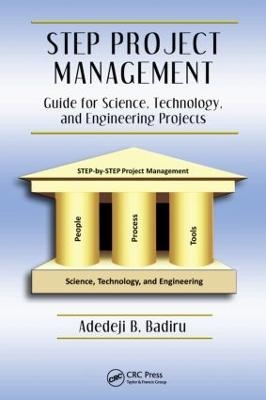
STEP Project Management
Guide for Science, Technology, and Engineering Projects
Seiten
2009
Crc Press Inc (Verlag)
978-1-4200-7235-8 (ISBN)
Crc Press Inc (Verlag)
978-1-4200-7235-8 (ISBN)
Presenting a step-by-step approach to managing projects in science, technology, and engineering, this book uses time-tested concepts of the Project Management Body of Knowledge. It combines managerial, organizational, and quantitative techniques into a logical sequence of project implementation steps.
While the project management body of knowledge is embraced by disciplines ranging from manufacturing and business to social services and healthcare, the application of efficient project management is of particularly high value in science, technology, and engineering undertakings. STEP Project Management: Guide for Science, Technology, and Engineering Projects presents an integrated, step-by-step approach to managing projects in these complex areas, using the time-tested concepts, tools, and techniques of the Project Management Body of Knowledge (PMBOK®).
STEP is an acronym for Science, Technology, and Engineering Projects, and also serves as a mnemonic reference to the step-by-step approach of the book.
This volume takes an approach that combines managerial, organizational, and quantitative techniques into a logical sequence of project implementation steps. The book begins by exploring the special methodology imperative for managing these types of sophisticated projects. It then delineates the major steps involved in project integration. The author discusses the management of scope, time, cost, quality, human resources, communications, risk, and procurement. Then, using a compelling case study that profiles the errors leading to the 1986 Challenger disaster, the book examines how flaws in decision-making, failure to consider all factors, lack of communication, and inappropriate priorities can lead to catastrophe.
In today’s fast-changing IT-based, competitive global market, success can be even more elusive and hard won. Effective project management in all facets of operations can give an enterprise the advantage it seeks. In this book, the author’s direct writing style, designed to appeal to busy professionals, conveys the complex concepts of high-stakes project management in a simple, efficient manner. He provides a general framework that shows what needs to be done to manage complex projects, using steps that are flexible, expandable, and modifiable.
While the project management body of knowledge is embraced by disciplines ranging from manufacturing and business to social services and healthcare, the application of efficient project management is of particularly high value in science, technology, and engineering undertakings. STEP Project Management: Guide for Science, Technology, and Engineering Projects presents an integrated, step-by-step approach to managing projects in these complex areas, using the time-tested concepts, tools, and techniques of the Project Management Body of Knowledge (PMBOK®).
STEP is an acronym for Science, Technology, and Engineering Projects, and also serves as a mnemonic reference to the step-by-step approach of the book.
This volume takes an approach that combines managerial, organizational, and quantitative techniques into a logical sequence of project implementation steps. The book begins by exploring the special methodology imperative for managing these types of sophisticated projects. It then delineates the major steps involved in project integration. The author discusses the management of scope, time, cost, quality, human resources, communications, risk, and procurement. Then, using a compelling case study that profiles the errors leading to the 1986 Challenger disaster, the book examines how flaws in decision-making, failure to consider all factors, lack of communication, and inappropriate priorities can lead to catastrophe.
In today’s fast-changing IT-based, competitive global market, success can be even more elusive and hard won. Effective project management in all facets of operations can give an enterprise the advantage it seeks. In this book, the author’s direct writing style, designed to appeal to busy professionals, conveys the complex concepts of high-stakes project management in a simple, efficient manner. He provides a general framework that shows what needs to be done to manage complex projects, using steps that are flexible, expandable, and modifiable.
Adedeji B. Badiru is a professor at the Air Force Institute of Technology in Dayton, Ohio.
Science, Technology, and Engineering. STEP Integration. STEP Scope Management. STEP Time Management.
STEP Cost Management. STEP Quality Management.
STEP Human Resource Management. STEP Communications Management. STEP Risk Management.
STEP Procurement Management. STEP Case Study: Space Shuttle Challenger. Appendix A. Appendix B. Appendix C.
Index.
| Erscheint lt. Verlag | 20.4.2009 |
|---|---|
| Reihe/Serie | Systems Innovation Book Series |
| Zusatzinfo | 80 Tables, black and white; 128 Illustrations, black and white |
| Verlagsort | Bosa Roca |
| Sprache | englisch |
| Maße | 156 x 234 mm |
| Gewicht | 703 g |
| Themenwelt | Wirtschaft ► Betriebswirtschaft / Management ► Projektmanagement |
| ISBN-10 | 1-4200-7235-8 / 1420072358 |
| ISBN-13 | 978-1-4200-7235-8 / 9781420072358 |
| Zustand | Neuware |
| Haben Sie eine Frage zum Produkt? |
Mehr entdecken
aus dem Bereich
aus dem Bereich
mit traditionellem, agilem und hybridem Vorgehen zum Erfolg
Buch | Softcover (2024)
Wiley-VCH (Verlag)
39,90 €
Agil – Klassisch – Hybrid
Buch | Hardcover (2022)
Springer Gabler (Verlag)
59,99 €
Die einfachen Geheimnisse agilen Managements
Buch (2022)
Hanser (Verlag)
36,99 €


